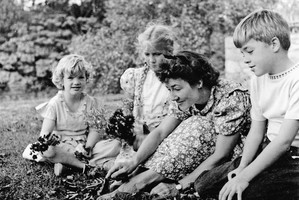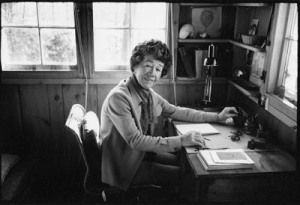 I never really knew Anne Morrow Lindbergh until quite recently. Oh, there’ve passing references to “the Lindbergh baby” and murmurs about Charles Lindbergh’s supposedly Nazi-friendly sympathies. But Anne Morrow Lindbergh, wife of Charles and mother of the kidnapped and murdered baby, remained a ghostly unspoken figure in these passing asides.
I never really knew Anne Morrow Lindbergh until quite recently. Oh, there’ve passing references to “the Lindbergh baby” and murmurs about Charles Lindbergh’s supposedly Nazi-friendly sympathies. But Anne Morrow Lindbergh, wife of Charles and mother of the kidnapped and murdered baby, remained a ghostly unspoken figure in these passing asides.
But then in the spring of 2012, her last book of published journals, Against Wind and Tide, surfaced on my radar and I devoured it. I found in her a kindred spirit, a wife, a mother, a woman who had suffered deeply and rejoiced mightily throughout her storied life, a woman who only relatively late in life found her voice (and her self) and remained undaunted and persistant in her search to set it free through her writing. Right after her journals, I read her Gift From the Sea, the work she is best known for and which also deeply touched my feminine creative heart.
So it was a happy gift to encounter Ms. Lindbergh again, so beautifully realized in the pages of Melanie Benjamin’s excellent novelization of her life, The Aviator’s Wife, our last pick for this series of the Literary Wives discussion group. It was a perfect book to close with and kept me glued to the page for nights on end.
The journals I read previously were of Anne’s life from about halfway through this novel through to the end and even a bit beyond. I enjoyed the beginning of the novel and learning about her life as a shy, awkward, day-dreamy diplomat’s daughter who just didn’t seem to fit in. Young Anne had dreams she wasn’t quite sure how to fulfill, making her easy prey for the larger-than-life Charles Lindbergh who swept her off her feet before she really had much of a chance to think any of it through. In this way, she reminded me ever so much of Hadley in The Paris Wife who was in many ways very similar to Anne — a creative woman with drive and spirit who chose a life of excitement and unpredictability beside a man whose own force and drive nearly engulfs and subsumes her own. “Nearly” is the operative word — Anne, like Hadley, survives, almost by the skin of her teeth, and comes through stronger and more self-actualized than her husband, for all of his accomplishments.
In contemplating the role of the wife in the novel, I’d have to say she serves (from the male perspective) as an object lesson — a tabula rasa, meant to be molded and worked to specifications, no more, no less. I suppose this sounds harsh, but the circumstances and events within the marriage were quite harsh and a weaker woman would most certainly have crumbled under them — particularly under the brutal weight of the final unforgiveable secret which Anne discovers just before Charles’s death and which you will have to read the book to find out about.
I say “object lesson” because it is clear that Anne is talented and has dreams she’d like to pursue; however, Charles insists that she be his co-pilot and partner and he teaches her to follow his dreams and to help him to succeed in fulfilling them. This isn’t necessarily wrong or bad — spouses should assist one another in becoming fully-developed humans, capable of reaching their full potential in all aspects of life. But no spouse should coerce or commandeer the dreams of the other, and that is very much what happens in this marriage.
This is touchy territory — Charles is not protrayed as an ogre and clearly Anne chooses — she is never FORCED. But it’s the way in which these things come about that disturbs and troubles the mind of the reader. It is almost as if she is being gaslighted into things rather than doing them fully freely, because it is truly the thing she wants to do above all others. For example, Anne really wants to write, but as a busy wife and mother who spends the majority of her time alone tending to life while her husband cavorts the planet, she has precious little time or mental energy to spare for creative work. Charles effects to support her in pursuing her literary dreams, even building her a little cabin off their country estate so she has room and quiet to think — but then he tells her what he thinks she should be writing and enlists her support in writing for and about him and his life exploits. It is as if he supports her talent and the time it takes to nurture it so long as it forwards his own goals and desires….this was difficult to read, especially given my previous knowledge of Anne’s struggles and the gift her works have been to me. That she had to literally dig herself out from under her husband’s devouring shadow speaks to her strength, but it also speaks to something very psychologically dark in the underbelly of the marriage that was hard for me to stomach.
Every time Anne tries to assert herself, especially in things concerning the welfare of her children, Charles undercuts her with the same argument about his need of her and her essential role (which he has groomed her into) as his partner and copilot, making her feel time and again that he cannot do anything without her and thus forcing her to choose between the things that identify the very soul of who she is — her motherhood and her writing — and their relationship. Charles wants her full attention and support, but is not willing or able to give her the same in return, nor does he have any deep capacity for sharing her with the other two essentially necessary components of her life — their children and her words.
 It is clear to me that Anne loves Charles and she sees his flaws clearly, though perhaps not as early as she might have. And Anne is herself flawed — there are issues of classism, naiveté, prejudice, and entitlement that can make her off-putting. There is no attempt at idolizing in Benjamin’s portrait. She strives for wholeness and I believe she achieves it. For all his shortcomings, Charles does give to Anne a powerful gift — he nurtures courage in her heart and through his pushing, she learns to trust herself in a way she might not otherwise have been able to. In a similar way, Anne provides Chares with the emotional stability, love and sincere human contact that he was deprived of as a child. He is an emotionally stunted human, incapable of real depth and this defect makes him dangerous. Marriage to a man like Charles ultimately means living life alone.
It is clear to me that Anne loves Charles and she sees his flaws clearly, though perhaps not as early as she might have. And Anne is herself flawed — there are issues of classism, naiveté, prejudice, and entitlement that can make her off-putting. There is no attempt at idolizing in Benjamin’s portrait. She strives for wholeness and I believe she achieves it. For all his shortcomings, Charles does give to Anne a powerful gift — he nurtures courage in her heart and through his pushing, she learns to trust herself in a way she might not otherwise have been able to. In a similar way, Anne provides Chares with the emotional stability, love and sincere human contact that he was deprived of as a child. He is an emotionally stunted human, incapable of real depth and this defect makes him dangerous. Marriage to a man like Charles ultimately means living life alone.
However, like the other female characters in The Paris Wife and American Wife, Anne chooses to love, chooses to stay, chooses to work and persevere in a less than ideal marriage. She eventually also chooses to stand up for herself and what is most dear to her. She chooses, too, to sacrifice herself for the good of her children to give them the best possible life in an otherwise wholly unconventional and not necessarily happy domestic arrangement. It is an arrangement in which she, while certainly chosen by Charles once, is not chosen by him over the long-term, especially once she ceases to continue to run after him.
Ultimately, perhaps, Charles feels his Pygmalion project is unsuccessful, which accounts for his actions towards the secret revealed at the end of the novel. This is nothing less than devastating. Anne does nothing to deserve his treatment of her and the fact that she manages to rise above pettiness and bitterness to live a life of gift to others speaks a great deal to her character. Charles is a problematic figure. There is a lot about him which, like Hemingway in The Paris Wife, is very attractive. But simply because a man is attractive and fun to be with and exciting at times, does not necessarily mean he will be a good husband. If there is anything that is a common thread through all of the books we’ve read for this series it is this essential fact. There is the sense throughout the book that actions speak louder than words when it comes to love — and there are some actions that are so antithetical to love that it would seem hard to survive the depth of the betrayal. But Anne does survive and she becomes more fully human in her pain.
One of the things I liked best about this novel is the authenticity of voice Benjamin  achieves with Anne. Since I’ve read her journals and her non-fiction, I was worried that the voice in the novel would be different than the Anne I’d gotten to know. But Benjamin did her homework and Anne’s voice rings through loud and clear in this fictional presentation.
achieves with Anne. Since I’ve read her journals and her non-fiction, I was worried that the voice in the novel would be different than the Anne I’d gotten to know. But Benjamin did her homework and Anne’s voice rings through loud and clear in this fictional presentation.
The Aviator’s Wife is a beautiful, poignant, joyful, and often absolutely heartbreaking journey through one woman’s life which could stand as representative for the lives of many women. It is, ultimately, a testament to the authenticity of the feminine genius and the need to cultivate this spirit of creative self-giving, often under the most challenging circumstances. I recommend it wholeheartedly. And if you happen to be a writer, Ms. Lindbergh is someone you’ll want to get to know as a friend and mentor — be sure and check out the other two books I mention in this post.
Don’t forget to visit my Literary Wives cohosts — Emily, Ariel, and Audra — for their take on The Aviator’s Wife. Did you get a chance to read the book? What did you think?



I had no idea that she was a writer! Lovely review.
LikeLike
Check out the journal, Carolyn. I believe it would speak to you.
Thanks for stopping by and for leaving a comment. 🙂
LikeLike
I love your take on it! You put things so nicely and I loved hearing that Anne’s voice is authentic to what you’ve read of her work and journals. I just finished Gift from the Sea, and I agree. I loved it, and I loved her voice and the way it seemed to intertwine with Benjamin’s novel. I also agree with this statement that you made: “But no spouse should coerce or commandeer the dreams of the other, and that is very much what happens in this marriage.” Yes! Absolutely. Later you refer to what Charles has done as “grooming” and I think that word says it all.
LikeLike
Thanks, Emily. I’m so glad you read her Gift from the Sea. It’s such a beautiful book, which speaks to you at different places along your journey through life. I’m looking forward to reading your post.
LikeLike
It was interesting because at the end of the version I read, she had written more. It was a reflection, and she noted not having been in the “final” stage that she described in her book at the time, but having since gone through it and how her perspective had changed. I liked reading that note at the end as much as the book!
LikeLike
I have the same note, but since it’s been a year since I read it, I need to look at it again!!!! 🙂 I did love it though and found it a sure companion through the cycles of a woman’s life. It could certainly be something one read every year or so as one went along, don’t you think? She mentioned in her journals how she’d almost wished she’d never written the book because she saw how much she continued to change over the years and how with each passing year she was farther and farther away from the self she was when she conceived the book. Yet everyone continued to speak about it and write to her concerning it. It was almost like a burden to her in later years. Too bad she couldn’t know then the gift it would be to those of us who were to come later.
LikeLike
P.S. I’m having trouble leaving any comment on Audra’s blog. Weird, with all of that between sites…..
LikeLike
I just made a comment and it didn’t work! More later…
LikeLike
It came through no problem…..looks like they fixed the problem?
LikeLike
Oh good. I can see it now!
LikeLike
Excellent review Angela and a promising book I think. My list is so long that I can’t say I will read it, but you never know, it certainly sounds well worth reading if I get the chance. Thanks so much for your post, really enjoyed reading it – as insightful a review as always.. 🙂
LikeLike
You have so much on your list already, Ruth. As do I. 🙂 But maybe some day you will come across it and decide to pick it up. I hope one day to write a historical novel and so I have very much appreciated the technique evidenced in this and in The Paris Wife. Mentoring, right? Thanks for reading and for leaving a comment. I’ll write soon — I’ve not forgotten.
LikeLike
Pingback: Literary Wives Part Four: The Aviator’s Wife | One Little Library
Wonderful review! I will miss your insights.
I definitely need to read Gift from the Sea now. It sounds fascinating and lovely! I’m glad that you comment on Anne’s faults, because I think they play into why I really didn’t connect with her.
I love this quote you wrote: “Charles effects to support her in pursuing her literary dreams, even building her a little cabin off their country estate so she has room and quiet to think — but then he tells her what he thinks she should be writing and enlists her support in writing for and about him and his life exploits. It is as if he supports her talent and the time it takes to nurture it so long as it forwards his own goals and desires…” YES. That frustrated me so much! In many ways, it seems he is desperate for others’ approval, and he is constantly wanting to be seen again as the hero. When his reputation is destroyed during WWII, he is constantly trying to re-brand himself as the hero again.
LikeLike
Thanks so much, Ariel!
One of the things I appreciate about Anne’s character is that she seems sincere in her self-examination. I noticed this in her journal, as well. It seems to me that people who can experience the greatest transformations in life are those who are able to tolerate the greatest degree of self-examination, those who are able to be honest about their weaknesses.
I think you are right about Charles’s self-esteem and his need to be a hero….the definition of hero was really skewed in this book. I kept thinking, “He’s a HERO? REALLY?” Not that it’s small change to fly solo across the Atlantic, but wow…WWI and II really gave a different meaning to the word “hero” and he just doesn’t fit the bill for me. Heroes sacrifice and it isn’t about THEM. A real hero possesses humility. Charles doesn’t meet this definition in any way. I would have liked to explore his character and the theme of heroism more deeply.
Do read Gift from the Sea — I think it will speak to you. 🙂
LikeLike
Pingback: The Aviator’s Wife reads Woolf | Blogging Woolf
Pingback: Literary Wives Wrap-up: Raising the Question of Larger Significance | Persephone Writes